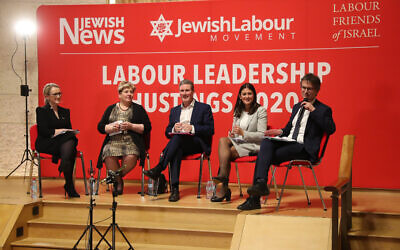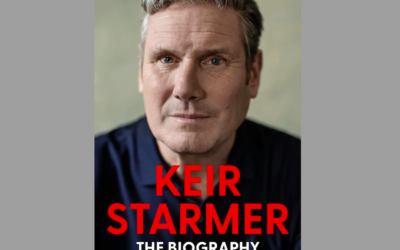Keir Starmer biography reveals Corbyn’s failure on antisemitism makes him ‘shudder’
Labour leader's hurt as members of his wife Victoria's synagogue in St John's Wood told him they could not vote for the party under Corbyn
Lee Harpin is the Jewish News's political editor
Keir Starmer considered quitting Labour’s shadow cabinet “several times” over Jeremy Corbyn’s failure to tackle antisemitism – admitting to a close aide he could no longer defend the situation “to his members, his family, his constituents.”
A revealing new book on the Labour leader’s life story details how he still recalls “with a shudder” conversations with congregants at St Johns Wood Liberal Synagogue who told him they could no longer vote Labour under Corbyn’s leadership “because they were Jewish.”
Starmer made visits to the shul with his wife Victoria, and their children in the years between 2017 to 2019 during the antisemitism crisis, author Tom Baldwin reveals, and he felt the impact of the scandal “more personally – and viscerally – because Vic’s family are Jewish too.”
After leaving a hustings event, again at the same St John’s Wood shul ahead of being crowned the new Labour leader, and only days after the death of his mother-in-law Barbara, an emotional Starmer is revealed to have told an aide:”:”If we win, day one, we fix this. This cannot carry on.”
Keir Starmer The Biography also presents a new analysis of the current Labour leader’s relationship with Corbyn, who he served under in the shadow cabinet, challenged the criticism levelled up him by critics, who have suggested he failed to effectively challenge him over anti-Jewish racism in the party, and claims that he considered the Islington North MP a “friend” at one stage.

The book also offered new detail about Starmer’s relationship with his wife, and with her Jewish family background, along with revealing new insight into a previous six year-old relationship with Phillippa Kaufmann KC.
With an impressive grasp for detail, Baldwin’s book, published on February 29th, by Harper Collins, sheds new light on one of the darkest periods in Labour ‘s history.
It is not though an authorised biography as Labour leader has neither handed over private papers for examination, and did not have control over the eventual contents of the book.
It explains how the crisis around rampant anti-Jewish racism was often fuelled by party members who were so hostile to the state of Israel that their views “metastasised into forms of prejudice against Jewish people that go back through the centuries and some of humanity’s darkest periods of history.”
Starmer himself is revealed to have described antisemitism as “a type of racism that festers and to which those who call themselves anti-racist are often most blind”.
But Baldwin notes that prior to becoming leader, the Holborn and St Pancras MP’s own involvement in facing down antisemitism has been open to question.
But in the chapters dealing with the issue, Starmer, who, like his wife is described as being not overly religious, describes the dramatic impact conversations with angry members of St Johns Wood Liberal shul had on him.
Starmer tells the author:”People I got to know a bit at synagogue would come up to me, asking ‘What’s happened to your party? Why can’t you do something? Are you embarrassed to be a Labour MP?'”
After leaving shul, Starmer admits:”I would go home feeling angry.”
So angry in fact, that on one occasion, Chris Ward, his ex deputy chief of staff, who is interviewed for the book, recalls Starmer came to work one morning saying he was “going to have to resign” after deciding “he couldn’t defend this to his members, this family, or his constituents, it was very difficult for him.”
It was not the only occasion Starmer considered quitting over Labour’s antisemitism crisis.
“He considered resigning several times,” writes Baldwin.

Just a few days after the death of his wife Vic’s mother Barbara came another pivotal moment that influenced Starmer’s determination to root out antisemitism from the party if he became the man to succeed Corbyn as leader.
The book details how Starmer had taken his family to their synagogue close to Lords cricket ground with his devastated father-in-law Bernard following the death of his wife “to hear her name read out, as is the Jewish custom for those who have passed away.”
It was February 2020, at the height of the Labour leadership contest, and the emotion of the death of his mother-in-law, along with the battle to lead the party is revealed to have left Starmer conflicted between “political and real-life worries.”
Things were made even more emotional for him when the Jewish Labour Movement’s leadership hustings event took place at the same St John Wood Liberal shul venue in front of a capacity 750 audience including some of those most impacted in the community by the antisemitism crisis in the party.
After issuing an impassioned apology to the community, the book reveals that Starmer left the meeting distraught after what he had just heard.
Instead of analysing how his performance at the event had gone, and where it could have been improved, as was his usual practice, his ex-aide Ward tells Baldwin the Starmer was “silent and upset”.
Getting into a cab, it was here that Starmer is revealed to have pledged to his deputy chief of staff at the time:”If we win,-day one, we fix this. This cannot carry on.”

Baldwin’s book also attempts to get to the truth about Starmer’s relationship with Corbyn, and the decision to remove the party whip from the ex-leader over his response to the report from the equalities watchdog.
It questions why Starmer did not actually resign from the shadow cabinet in protest, himself.
“I did question myself the whole time about whether I should stay or leave,” Starmer says. “But I thought, on balance, it’s better to fight it from the inside.”
In an otherwise excellent 385 page book, perhaps this argument over why he did not actually decide to resign could have been developed further.
Baldwin notes there were those, including Diane Abbott and the former Labour MP turned independent peer Ian Austin, who have continued to suggest Starmer did little to challenge Corbyn over antisemitism while in his top team.
But other’s, including Tom Watson, former deputy leader under the former leader, and one of Corbyn’s most senior aide’s, whose name is not revealed, both view Starmer’s conduct at the time differently.
The ex Corbyn aide said Starmer was one of those responsible for pressing Corbyn to produce weekly reports on the backlog of antisemitism complaints.
Watson, now a Labour peer, tells Baldwin that the current Labour leader used to give “Jeremy the full barrister treatment.”
He adds:”Jeremy could not meet his eyes…. Keir got into his head and into the sinews of his soul.”
The book notes more public appearances where Starmer made clear his concerns. On the BBC’s Andrew Marr Show he called for the party to adopt the IHRA definition of antisemitism “sharpish”, while at a 2019 appearance at The Hay Festival he told the audience that denial of a problem was “part of the problem.”

Baldwin says Starmer’s argument was proven at this time when Alistair Campbell was expelled from the party for voting Liberal Democrat in the European elections, while party members quoting Holocaust denialists were merely suspended.
Elsewhere, the book also attempts to provide explanation for Starmer’s much quoted interview clip in which he declares Corbyn to be a “friend.”
Such apparent loyalty was, according to Charlie Falconer, the lawyer who served on the frontbench under Corbyn and in his cabinet, was a trait probably left over from Starmer’s days in the legal profession.
Falconer says good lawyers never allow their real thoughts about a client they are representing to be known, and for this reason Starmer’s actions in front of the former leader should not be seen as proof he thought “Corbyn was a good thing.”
There is impressive background given on the events leading up to Corbyn’s eventual loss of the party whip following the publication of the EHRC report into antisemitism in the party.
At first, it is revealed Starmer had wanted to avoid all the focus from the devastating conclusions in the report to be on Corbyn himself.
In a meeting with Angela Rayner, staff and officials, Starmer, now Labour leader on the back of a pledge to unify the party, had insisted he did not want all the blame for the anti-Jewish crisis to be put on “any one person or leader.”
The crisis over antisemitism was far “deeper” than that, he insisted.
On the evening before the report was published Starmer admits speaking with Corbyn to outline the strategy for the next day. But a breakdown in communications, with Corbyn fearing he was about to be condemned outright by the new leader, led to him releasing his now infamous response claiming the EHRC report was “overstated for political reasons.”
It is revealed that Rayner made an unsuccessful attempt to make Corbyn withdraw the inflammatory statement, and the situation deteriorated.
Starmer though, with his legal background, was keen to take himself away from the actual process of taking action against Corbyn.
The book explains how when former Unite boss Len McCluskey and MP Jon Trickett attempted to fix the situation so that Corbyn would be allowed back, Starmer refused to even look at the wording they asked him to agree.
He is quoted as saying:”That isn’t how I do business.”

The decision, initially to suspend Corbyn’s membership of the party, is revealed to have been taken by general secretary David Evans.
But in a sign of how Starmer recognised he could no longer trust those on the left of the party, the decision to remove the Labour whip, following complaints about Corbyn from the Board of Deputies and others, did see the leader becoming involved.
But the book also includes lighter, more personal details about how a working-class boy from Hurst Green, Surrey, ended up becoming the first in his family to attend university, Leeds, before going on to Oxford University to complete a masters in law, and then going on to enjoy as successful career as a human rights barrister, and as the country’s chief prosecutor, before entering politics relatively late in his life.
We learn more about a six year long relationship with the now very successful Phillippa Kaufmann KC, prior to Starmer meeting his wife.
The pair split up in 1999, but not after purchasing a house with Starmer, which she still lives in with children from a subsequent relationship.
Kaufmann and Starmer remain friends, and she attended his wedding to Vic. She describes Starmer as being “very capable” and “very driven” and supportively adds, he “needs to win this election.”
But it is with Victoria Alexander, that the Labour leader met the woman he would eventually marry. The book reveals the initial tensions in their relationship as they spoke to one another on the telephone for work purposes.
Vic, as the leader now calls her, was then a solicitor, while Starmer was a barrister. After one call she put the phone down and complained:”Who the f**k does he think he is.”

Ten years younger than her eventual husband, we learn that her father Bernard was born in England, from a family whose roots were found in the Polish village of Kolo.
The book reveals Victoria travelled by herself to the village, where until the Shoah nearly half of all the residents were Jews, to meet and speak with people who had memories of her father’s family.
The couple married in May 2007 at Fennes Estate in Essex, although there is no detail given in the book on whether any Jewish customs were observed on the big day.
In his speech Starmer recalled:”I wanted Vic to know how much I thought of her, what I could see in her, the love I got from her.”
The Labour leader, who has spoken previously about the impact on him of the deaths of his own parents, was similarly left devastated when his wife’s mother died in January 2020, following a car crash.
The tragedy came during the intense Labour leadership campaign, which Starmer decided to suspend for two weeks so he could be alongside his wife, a move Victoria herself told him he did not need to do.
Starmer tells Baldwin:”To watch Vic lose her mum was even harder for me than losing my parents. I felt completely helpless because I couldn’t reach into the space to stop her hurting.
“All I could do was show her how much she mattered to me.”
Keir Starmer The Biography is published on February 29th by Harper Collins. HB £25. EB £14.99

Thank you for helping to make Jewish News the leading source of news and opinion for the UK Jewish community. Today we're asking for your invaluable help to continue putting our community first in everything we do.
For as little as £5 a month you can help sustain the vital work we do in celebrating and standing up for Jewish life in Britain.
Jewish News holds our community together and keeps us connected. Like a synagogue, it’s where people turn to feel part of something bigger. It also proudly shows the rest of Britain the vibrancy and rich culture of modern Jewish life.
You can make a quick and easy one-off or monthly contribution of £5, £10, £20 or any other sum you’re comfortable with.
100% of your donation will help us continue celebrating our community, in all its dynamic diversity...
Engaging
Being a community platform means so much more than producing a newspaper and website. One of our proudest roles is media partnering with our invaluable charities to amplify the outstanding work they do to help us all.
Celebrating
There’s no shortage of oys in the world but Jewish News takes every opportunity to celebrate the joys too, through projects like Night of Heroes, 40 Under 40 and other compelling countdowns that make the community kvell with pride.
Pioneering
In the first collaboration between media outlets from different faiths, Jewish News worked with British Muslim TV and Church Times to produce a list of young activists leading the way on interfaith understanding.
Campaigning
Royal Mail issued a stamp honouring Holocaust hero Sir Nicholas Winton after a Jewish News campaign attracted more than 100,000 backers. Jewish Newsalso produces special editions of the paper highlighting pressing issues including mental health and Holocaust remembrance.
Easy access
In an age when news is readily accessible, Jewish News provides high-quality content free online and offline, removing any financial barriers to connecting people.
Voice of our community to wider society
The Jewish News team regularly appears on TV, radio and on the pages of the national press to comment on stories about the Jewish community. Easy access to the paper on the streets of London also means Jewish News provides an invaluable window into the community for the country at large.
We hope you agree all this is worth preserving.






















